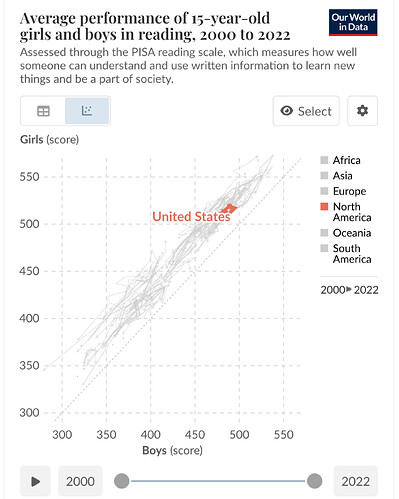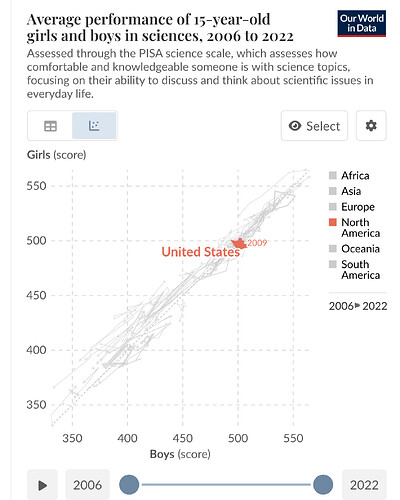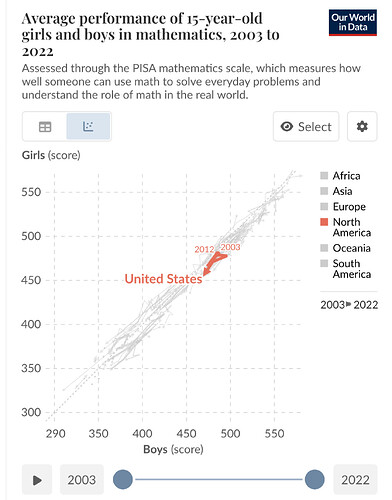This is false. I literally live in the bluest congressional district in my part of the country, in a neighborhood that voted 90% for the Democrat in the recent presidential election and have NEVER heard ANYONE say anything about “defunding the police”. That was a (IMO Bad choice of words) saying by a very tiny section of society and actually meant restructuring some law enforcement financing. Not to get into the politics, but not letting this misleading statement go. The people I know (who are almost all lefties) respect the law and respect law enforcement as well as the military. FWIW my husband is an Army veteran and has never felt disrespected.
The supposed genetic differences offered thus far are nothing but stereotypes and the scientific basis for social policy based on the stereotypes hasn’t been established.
IMO you and @hebegebe are looking for over-simplistic answers to complex issues, and no one is “wrong” (@hebegebe’s condescending word) for seeing past the broadbrush unsupported stereotypes.
The only one who has said that men were behaving irrationally was you, in this same post.
As for “behaving like women” what on earth are you talking about? No stereotype there, right? ![]()
Because you continue to distort what I say, in this thread and others, you just earned the honor of being the one and only person on my CC ignore list. Congrats.
Thank you @AustenNut for everything you do to make CC a better place.
I suspect that most of the men that the people on this thread know are doing fine. But the CC community is not representative because it skews towards higher intelligence and higher income.
I don’t think that approach is helpful to the men that are already disaffected. They have already tuned out messages like yours, and without veering too much into politics, are now susceptible to populist voices that speak to them.
I am wondering if we can return to the topic of high school, when the underperformance by males first starts, and as a consequence, limits later college and career opportunities.
I don’t have a good feel of why this is the case. Is it because females improved their performance and males stayed the same? Did males start underperforming relative to males from previous years, and if so, what’s the cause of that? Is it related to changing family structure, including fewer father figure role models?
On a related note, since females minds mature earlier, would males benefit from being allowed to “redshirt” a year or two before or during high school (assuming of course there was something to keep them engaged, such as a community project)?
I wonder if it is the relative lack of kinetic activities now offered at many schools. Recess, Art/Music and Shop are the areas most often removed from school offering first. I wonder how much the stifling of physical and artistic expression within schools hurts social and emotional development, especially for young boys/men*.
Our children went to schools that promoted active play for children throughout their childhood, all the way til high school (with daily gym a requirement even if it was much more structured than the open recess plus daily gym of elementary/middle school). Music and Art also requirements throughout school from the earliest up to high school and our high school also offered vocational training (shop, engineering, home economics, coding, culinary, etc) through community partnerships.
Our district has strong outcomes for both young men and women - I wonder how much of that is in fact not having reduced the offerings that have so often been cut in education over the past 30-40 years.
*This is one of the reasons I so strongly support athletics in school, it remains one of the last areas where children/young adults can move their bodies and exercise strategy outside of purely ‘academic’ activities. Super important for many young people to remain engaged in education through high school.
You can check out the PISA scores for 15 year old boys and girls in reading, science and mathematics over the last ~20 years here:
In summary there’s been very little absolute or relative change, except for a recent modest deterioration in math scores during COVID which actually affected girls slightly more than boys. Boys modestly outperform girls in math, and girls substantially outperform boys in reading.
So it’s far from clear that actual standards of performance (at least when entering high school) have changed. But there could be changes in the weight given to different components over time. Do schools and colleges now value essays and grades more than math and test scores for example? Or do they value other attributes that correlate with girls’ greater maturity?
Also note that these charts give a mean figure and males have a significantly higher standard deviation in measures of intellectual ability such as IQ. It wouldn’t be surprising if the “struggling” population is concentrated at the lower end of the distribution.
I believe school outcomes overall have a lot more correlation with socioeconomic factors than with sports.
Actively is actually more important than sports per se. Kids ( and adults ) need physical activity for optimal performance and physical and mental health. I like the idea of students having time each day for that. It could be anything from football or volleyball team practice to dance, yoga, or even just getting outside for a walk.
I do agree that art, music and movement ( sports or otherwise) are very important. Unfortunately in the current times, I see those activities being the first to be cut when budgets are trimmed.
I wasn’t discounting socio-economic factors; the budget trimming of the activities I listed are directly correlated to the socio-economic factors of communities. Our district has the resources to continue offering all the activities I listed, unlike other districts that struggle with funding.
I do think middle school/high school sports are incredibly important to keep certain students engaged in education as they get older. There are many students who, without those sport offerings, wouldn’t see the point of going to high school. I think public education should serve as many students as possible - sports help serve those students and keep them in school.
Yes…and activity in how academic classes are taught is also important. Let’s say that groups of students need to find the answers to questions from a word bank. They can either have a word bank on the paper and figure out the answers together, or they can be physically racing to a designated spot to get a physical word and bring it back to the work area. When they’re needing to do sequencing activities, they can either just number the items in the correct sequence, or they can physically move the separated items into their correct order.
Learning styles are real, and a kinesthetic learning style is frequently found amongst males, but also among many females (certainly among the females in the alternative schools that I taught at). Most “traditional” teaching tends to lean on visual, auditory, and/or reading/writing learning styles and very little emphasis on the kinesthetic.
So whether kids are getting P.E. daily or are having other hands-on elective classes that are frequently cut when funding gets tight is definitely a factor, but how the regular “academic” classes are taught is also an important factor that is well within the control of our educational systems.
Excellent post @AustenNut and to add on further, in addition to learning styles being different, people differ in activity styles (for lack of a better term) also. That’s exactly why I advocate for “movement” - which does include sports. Johnny might thrive in competitive activities and team sports - which is great. Joey may be more suited to individual sports such as tennis,track.swimming,etc. Jimmy may not be athletic but might enjoy non competitive activities such as walking, yoga, etc. All good options.
One of my issues is that while some boys/young men thrive on sports, others do not. For every boy who is kept interested in school because of his sports involvement, there is at least another one who is being mercilessly bullied in middle/high school because he is not athletic. This is not a healthy thing for young men.
I hated PE in school. It emphasized team sports (which I was terrible at) and I spent decades believing physical activity was not for me. I believe PE is taught differently now.
This should be the jumping off point for this discussion. Not many posters here indicate that their sons/relatives are truly struggling. Of course there are some that have diagnosed mental health challenges, but that, to me, is an entirely different category that goes far deeper than the broad brush strokes present in this current discussion.
I didn’t know hero-ing was a word. I realize the “hero” tangent surfaced in some intellectual article above, but it seems misguided, almost weaponized to me, as quoted above. There aren’t many people that have done something heroic.
I’ve had the good fortune of knowing a few true heroes in my life, and yes, they happened to be males. The one characteristic they all shared was their reluctance to accept the moniker, or discuss the circumstances that earned them the classification. It’s a mistake to conflate documented heroism(or valor) with something like a barfly opening a bathroom door for a drug addict so they could wake up and go back to drinking with their buddies.
Heroes come in all shapes, sizes and genders. Men in general, and young men in particular, seem to have no intention of stepping into a dangerous situation to help someone these days. They’d rather film the unfolding tragedy to post it for clicks, likes and shares. All the hero nonsense is just another passive aggressive way to negatively stereotype men.
I mean, I don’t even know where to start with this comment. Who said women need saving? This line of thinking has more to do with women than men.
^^^ This x 1000. I’d loop EMS and Firefighters into this category as well. These professionals are dispatched by their identifying duty number. They don’t get to pick and choose the calls they respond to. Download the Scanner app and listen to your local Police/Fire/EMS radio traffic. It’s very interesting occasionally, but more often it’s routine.
^^^ This also x 1000. We all need more men and woman to choose a service career as a first responder or member of the military.
There is a small segment of both the male and female population that are entitled, and that’s hard to fix. It has nothing to do with gender.
Wow. That is all.
I know both young men and women who are struggling, but definitely more young men. I’m not saying just financial/employment struggles, but also emotional, social and physical.
I’ve mentioned before that things like social media, online gambling, video games and weed smoking all play a part.
This paragraph really struck me. I have a great deal of respect for actual heroes, actual valor. I never want to give the impression that I devalue (or mock, or “weaponize” as you say, true heroism.) I guess what I have a problem with is the idea that All Men have an Evolutionary Need to be heroes, and therefore need to be made to feel they are heroes, or else! As if Heroism is the equivalent of participation trophies (and oh by the way, it’s mainly the responsibility of women to hand out these Heroism Participation Trophies.) It’s that idea that I find gross. True heroism? Never a problem, total respect here.
(As a total off-topic aside, I have exactly one WWII vet left in my patient panel. I used to have so many. When I started I even had WWI vets. Time is going really fast.)
I’m a nurture proponent over nature. It’s like saying women must churn out babies to fulfill their purpose. That’s preposterous on its face.
People will live to regret legalizing and promulgating the use of cannabis. I also believe those variables you listed above contribute to both genders struggling. I feel like social media disproportionally affects females while sports gambling and video games affect males more often.
I think about the cultures that have “1,2, Many” counting systems. If you reach adulthood in such a society, many individuals can never learn to count. But there is nothing genetically or evolutionarily wrong with these individuals; if taught to count as children, they can all learn to count (and do math etc.) Nurture matters. In particular childhood nurture matters.
I would like to add this. Btw, I have girls, but to me it would apply to boys as well. My DW and I viewed our main role as a parent to prepare our children for adulthood and to leave the nest. We wanted to provide an environment that would help the children to that goal. As we all know life is not perfect with children and things get bumpy. We viewed our job first to be a parent and not a friend to the children. When we saw one child struggling we would intervene and try to get them back on track. We set expectations and if they did not adhere to them then there were consequences. Would we let them play video games, sure we would, but if that started to interfere with school or other things you better be sure it would have been dealt with. But in reality we didn’t have to do that really. They knew we didn’t throw out empty threats.
Many people in society don’t like confrontation. We had no problem calling out behaviors of the children that were to their detriment. Also if our kids ever started to not do well in school we were going to make sure they got back on the right track. But we never had to deal with our kids not turning or doing homework. They knew life could get way worse if they didn’t.
All of this might sound mean, but when one of your kids who is in the last semester of college thanks you for being so hard on them you know you did ok. Because she saw her peers struggling going onto the next stage of life.
Yes, our middle son was quite annoyed when we told him we would charge rent after a certain period. And that he would have to have health insurance to live with us (we are self-employed, so he couldn’t be on our plan). Of course, if he had a crisis come up, we would have helped, but he knew we expected him to make it on his own. Now at 29, he is self-sufficient and he and his wife are saving money for a house and retirement. Several of his friends are living at home with their parents.



